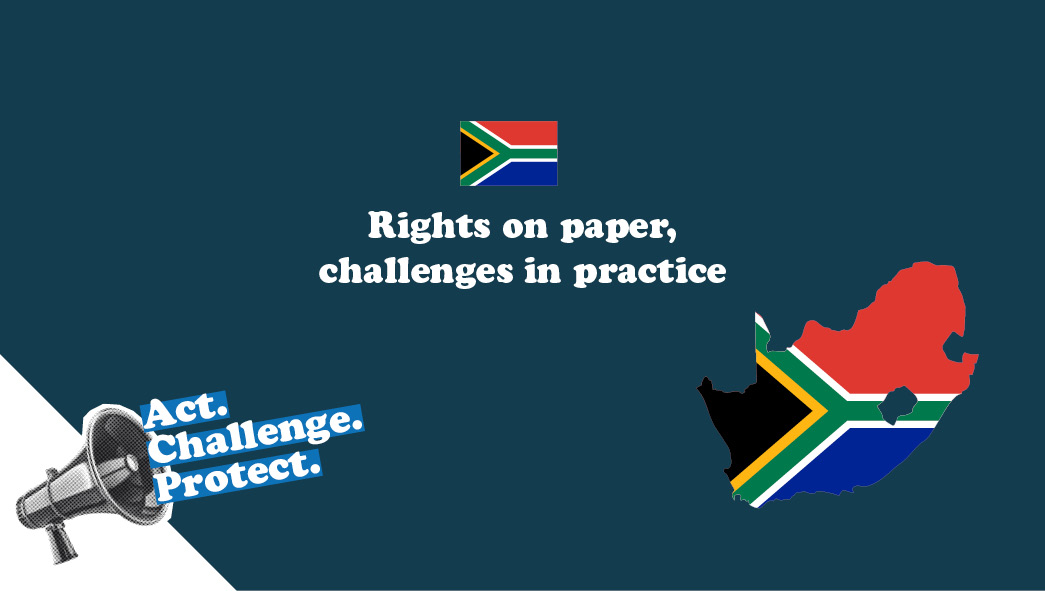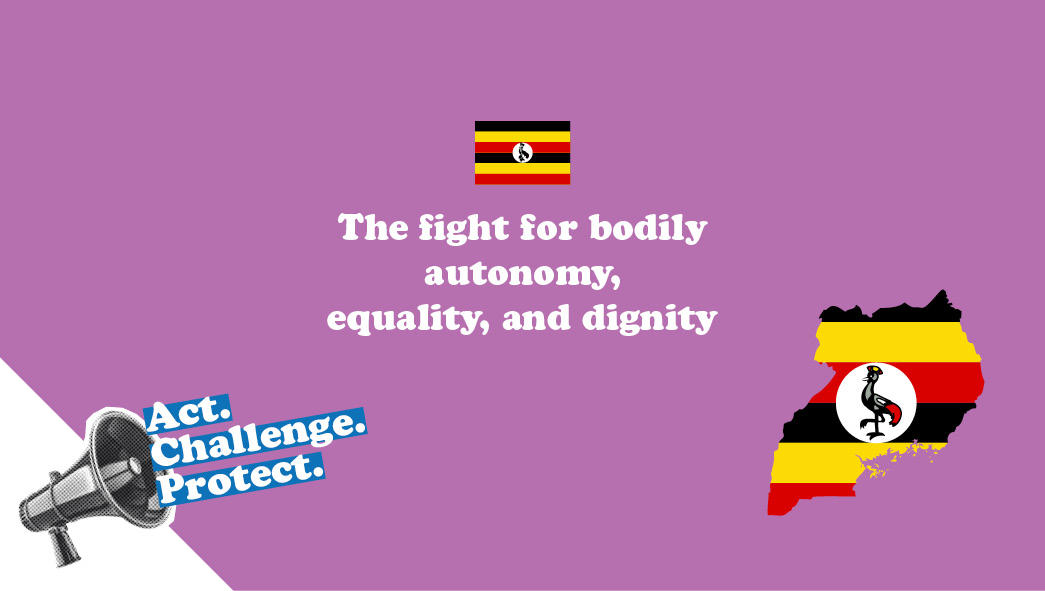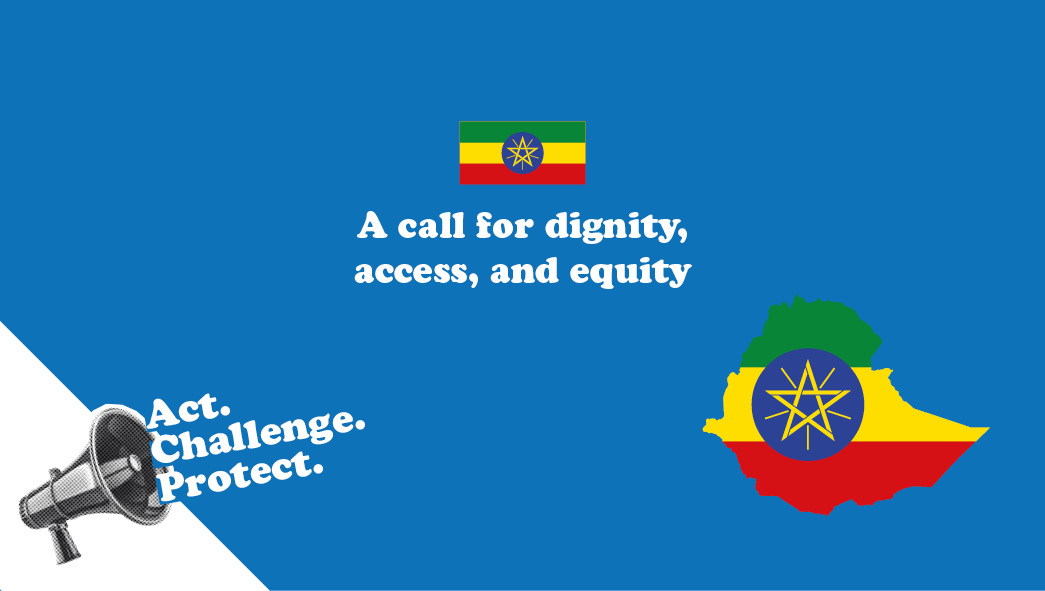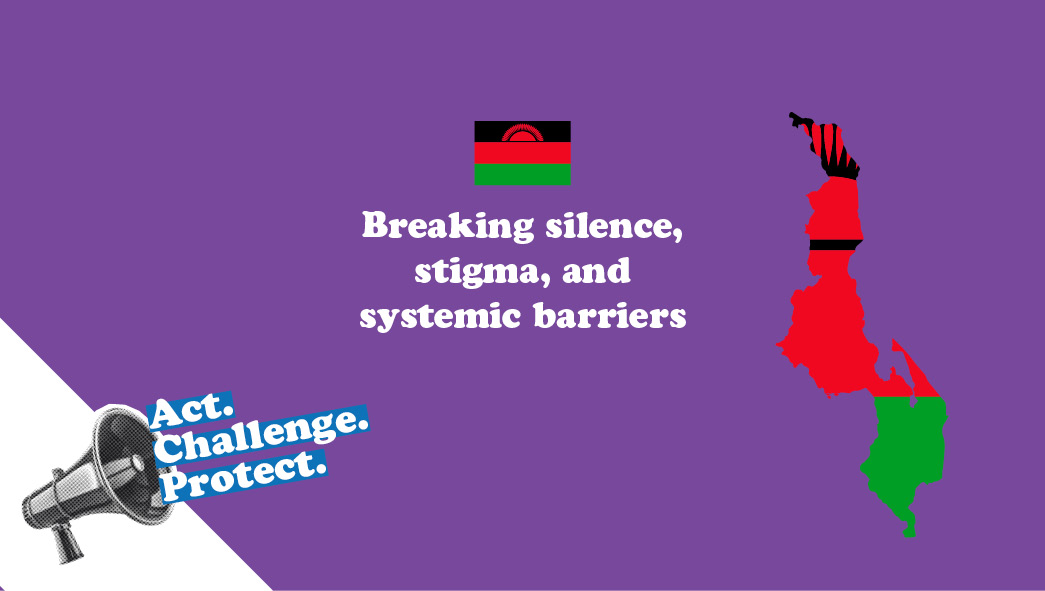SRHR in South Africa
Rights on paper, challenges in practice
South Africa has strong laws protecting sexual and reproductive health and rights. But for many people, especially women, young people, LGBTQI+ individuals, and persons with disabilities, SRHR services remain inaccessible, and these rights are not a reality. Challenges like sexual and gender-based violence including rape, stigma, and discrimination continue to affect lives.
The #ActForSRHR campaign calls on everyone to Act. Challenge. Protect. Because SRHR is for every BODY.
Top 5 SRHR challenges in South Africa
- Nearly 40% of women in South Africa experience physical or sexual violence in their lifetime. (Source)
- Over 10 000 girls under 14 gave birth between April 2022 and March 2023. (Source)
- Only about 58% of young people aged 15–24 used a condom during their last high-risk sexual encounter. (Source)
- Despite legal abortion, many women still seek unsafe procedures outside designated facilities. (Source)
- LGBTQI+ people often face discrimination and denial of healthcare services. (Source)
Sexual Health
The right to safe, respectful, and pleasurable sexual experiences.
South Africa has made good progress in HIV prevention. But not everyone can access sexual health services or education — especially young people, people in rural areas, and persons with disabilities. Let us not leave anyone behind!
What’s needed:
- Clear, age-appropriate sexuality education in all schools
- Free condoms and PrEP available in youth-friendly clinics
- Healthcare workers trained to treat everyone with respect, without judgement
Reproductive Health
Access to contraception, maternal care, safe abortion, and fertility support.
Abortion is legal in South Africa up to 12 weeks without needing a reason. Yet resistance from healthcare providers, shortage of trained professionals, and stigma make it harder for people to get the care they need.
Did you know?
- More than 50% of abortions happen outside the public health system (Source)
- Only 7% of government health facilities in South Africa provide abortion services, despite the legal provisions under the Choice on Termination of Pregnancy Act. This limited availability is due to various barriers, including a lack of trained providers, stigma, and resource constraints. (Source)
- 4 in 10 clinics that are supposed to provide abortion services don’t offer them (Source)
- Unsafe abortions ARE preventable!
What’s needed:
- Clinics must follow the law and provide safe abortion services
- Youth and community leaders need correct information about safe abortion
- More funding for clinics that offer private, respectful reproductive care
Sexual Rights
The right to express one’s sexuality and gender identity without fear.
South Africa is the only country in Africa where same-sex marriage is legal and where discrimination based on sexual orientation is against the law. But many LGBTQI+ people still face violence and are left out of healthcare.
Under South African law, consent to sexual activity must be free, voluntary [uncoerced] and informed.
What’s needed:
- Stronger protection of LGBTQI+ people’s rights
- Safe, respectful healthcare for all people, including trans people
- Public campaigns to challenge hate, discrimination, and promote inclusion
- Reform laws to ensure defenses based on subjective belief in consent are subject to stricter scrutiny and aimed at protecting victims’ rights more effectively.
Reproductive Rights
The freedom to decide if, when, and how many children to have.
In South Africa, too many girls and women still fall pregnant young — not always by choice, but because of pressure, lack of access to contraception, harmful social norms, or being taken advantage of. Behind many of these pregnancies is a larger crisis: gender-based violence (GBV).
GBV is a hidden pandemic in South Africa. It affects women and girls in homes, schools, clinics, workplaces, and communities. It includes rape, abuse, harassment, and coercion — and it strips people of their ability to make free and informed choices about their bodies and their futures.
True reproductive rights are not just about access to contraception or clinics. They are about freedom from violence, the right to safety, and the power to say yes — or no — without fear.
Everyone has the right to bodily integrity, safety, and dignity. That means tackling GBV is not separate from reproductive justice — it’s central to it.
What’s needed:
- Universal access to free contraception — no barriers, no stigma, no shame.
- Community-wide education on choice, consent, and power — so everyone understands that control over your body is a right, not a privilege.
- Real justice for young people affected by gender-based violence — that means support, accountability, and systems that put survivors first.
Because until these are guaranteed, reproductive rights are just words — not reality.
Enabling Environment
Systems and structures that support SRHR for all.
Even though South Africa has strong SRHR laws, they are not always implemented. Many rural and township communities do not get the services they need. Access to the criminal justice system must be strengthened to ensure prevention and effective protection for victims and survivors of GBV.
What’s needed:
- Regular checks to make sure clinics are providing SRHR services
- More money to support services for youth and persons with disabilities
- Mental health and social support included in SRHR programmes
- Sensitised law enforcement and judicial officers
Myths and misinformation in South Africa
Myth: “Abortion is illegal unless the mother is dying”
Fact: False. South African law allows abortion up to 12 weeks without restriction.
Myth: “Only sex workers need STI testing”
Fact: Everyone should have regular sexual health checkups.
Myth: “LGBTQI+ rights are only for the urban elite”
Fact: False. Rights belong to everyone, regardless of where they live.

Voices from South Africa
“I went to the clinic for contraception and the nurse told me to come back with my boyfriend.”
— Teenage girl, Eastern Cape (Source)
“It is not enough to have laws. We need implementation, access and accountability.”
— Dr Tlaleng Mofokeng, UN Special Rapporteur on the Right to Health (Source)
How you can take action in South Africa
✅ Use #ActForSRHR to share your story or speak out
✅ Demand full abortion access at your local clinic
✅ Support campaigns to end GBV and discrimination
✅ Call on government to implement the National Adolescent SRHR Framework




